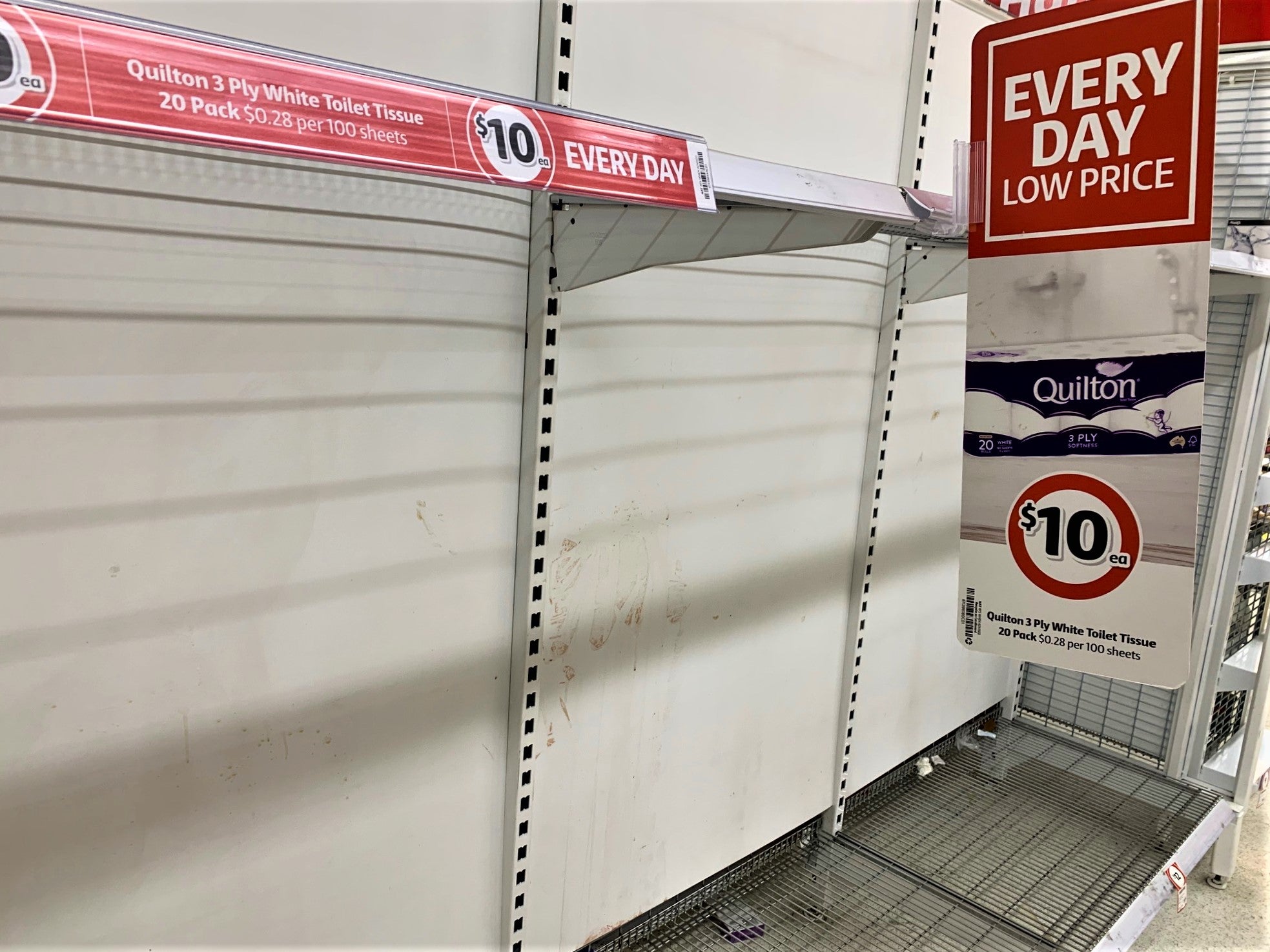‘Keep calm and stop buying toilet paper!’ Empty shelves in Australia as coronavirus fears prompts widespread panic buying
‘I put it down to stupidity. It’s craziness,’ a shopkeeper tells Gary Nunn, whose shop has just one toilet roll left


In the 1-Stop Convenience Store in Adelaide’s city centre, shopkeeper Pavan is looking at an empty shelf that’s usually full of toilet paper.
“By the end of Monday, all the loo roll had totally gone,” he told The Independent. “I guess people are worried coronavirus might spread and they don’t want to come out if they catch it.”
Pavan himself followed suit, buying “two huge packets – just to be on the safe side”.
Some are calling such stockpiling “prepping”, others criticise it as “panic buying” and all this week, #ToiletPaperEmergency has been trending on Twitter in Australia.
Around the corner from Pavan’s shop, on Adelaide’s main shopping street, Rundle Mall, both major Australian supermarkets, Coles and Woolworths, had almost completely sold out of toilet paper, with rows and rows of empty shelves where the rolls usually sat.
The two main Australian supermarket chains have both now imposed a temporary purchase limit of four packs per customer transaction. “This’ll help us maintain stock levels in stores while our suppliers increase local production and our distribution centres increase deliveries,” a Coles spokesperson told The Independent.
Other shopkeepers are baffled by the hysteria. “I put it down to stupidity. It’s craziness,” said Elle, a shopkeeper at OTR convenience store opposite Adelaide’s Parliament House, which had just one toilet roll left when The Independent visited.
On Friday, South Australian senator Rex Patrick tweeted: “Everyone! Please, please, please stop panicking. Toilet paper is made by Kimberly-Clark at Millicent in South Australia.” This echoed comments from Prime Minister Scott Morrison on Tuesday that he’d spoken to the major supermarkets to confirm there were no signs of a shortage on the horizon and urging calm.
But that message doesn’t seem to have been heeded. From the remote Alice Springs to suburban Sydney and Melbourne, social media is abuzz with pictures of trolleys stacked with toilet paper or empty shelves.
One Australian tabloid even printed a special eight-page pull-out for readers to use in place of toilet paper.
For Peter Nelson, 65, an economist from Turramurra, NSW, such stockpiling makes sense.
“When there’s any hint that you might be quarantined for weeks, of course the first thing you do is prepare for that by stocking up on necessities such as canned food and toilet paper,” he said. He has a whole storeroom with “a few months’ contingency” including canned beans, corn, tuna, beetroot, sauerkraut, rice and condiments.
“Governments coming out with statements of ‘don’t worry’ doesn’t help the equation since, if one has been lied to before, why would you believe them a second time?” he said.
Although there are anecdotes of individuals stockpiling dried food and other toiletries, it’s toilet paper that has flown off the shelves in the most shocking numbers.
Professor Nitika Garg described this as “irrational” buying behaviour: “People are creating problems where none exist,” she said.
The associate professor of marketing at the University of NSW said that Australia already makes 60 per cent of its own toilet paper, citing an Instagram post from Kimberly Clark reassuring consumers there’s more than enough toilet rolls to go around in Australia. “It was different in Hong Kong – their supply chain comes from China; they don’t manufacture most of theirs,” she said. “But even they’re fine now.”

Several factors colluded to create a phoney crisis, including pictures spreading around quickly on social media, and a domino effect from Hong Kong: “Australia has a large Asian community and there’s evidence that the toilet paper panic buying began in communities dominated by Chinese Australians who get their news from China,” she said. “After that, it was pure herd mentality,” Garg said.
As shop retailers sold out, consumers have turned to online stores. Australian online toilet paper company Who Gives A Crap? donates half of all its profits to help build toilets and reduce diarrhoea-related disease in developing countries. As of Friday, they had sold out.
CEO Simon Griffiths said that they’ve reserved enough stock to supply regular subscribers, but they’d seen a tenfold increase in usual orders on Tuesday, mainly coming from new customers. “It was unexpected! We never thought this would happen in Australia,” he said. “This week we became Australia’s number one toilet paper supplier, selling 27 rolls every second at our peak time on Tuesday.”
Staff at the philanthropic-driven organisation, which has seen UK orders pick up in the last few days, too, are working overtime in the hope of getting back to normal next week. “The silver lining is, we’ll be able to help more of the world’s 2.3 billion people who don’t have access to a toilet, and drive down diarrhoea-related disease, which is the second biggest killer of under fives in Africa,” Simon said.
Other surprising stock shortages have arisen as a result of reaction to the coronavirus.
Sydney dentist Frank Farrelly said a tripartite of factors – Australia’s bushfire crisis, coronavirus and supply chain issues from China – have seen a shortage in protective face masks which are essential for his job. “I’m hearing about shortages of face masks in dentists across Australia,” he said, adding that some had even reduced opening hours to ration their stock.
He’s stockpiling face masks at his dental practice in Sydney, but across several suppliers – some of whom have already started to impose limits on orders. “It felt like the responsible way to stockpile” he said.
A lot of consumer panic buying is a way of Australians attempting to regain control after recent turbulent times, Garg said. “This comes right on the heels of catastrophic bushfires and then flooding in certain parts of the country,” she said. “Australians have been in never-ending emergency mode since December. They’re cognitively and emotionally drained. This panic mode has led to an ongoing feeling of uncertainty and helplessness.”
She noticed her local shop in Sydney’s eastern suburbs had also sold out of pasta and flour.
Such stockpiling is against the advice of experts.
“There’s no need to stockpile food, medicine, petrol or anything at this stage,” said Professor Nigel McMillan, director of infectious diseases and immunology at the Menzies Health Institute at Griffith University, Queensland. “We don’t wish to induce panic buying when, for 95 to 99 per cent of the population, this’ll be a mild cold, nothing more.”
But Garg said measures such as supermarket restrictions on toilet paper could worsen matters and prolong panic.
“The counter messages are being drowned out by social media pics of shortages and bare shelves,” she said.
“There needs to be more reassuring messaging from retailers and manufacturers, because people simply don’t trust the government”.
Join our commenting forum
Join thought-provoking conversations, follow other Independent readers and see their replies
Comments